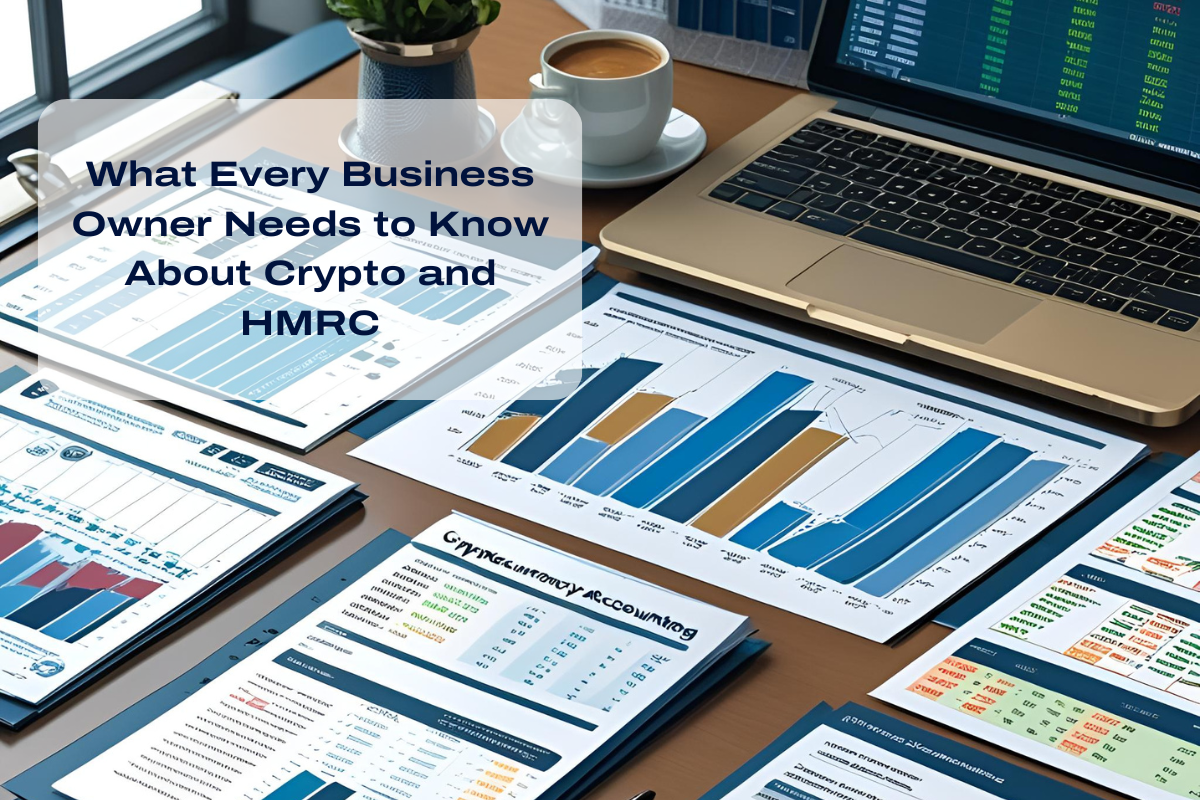Knowledge Portal: Managing Business Finances and more
CHRIS BARNARD July 29, 2025
How to Account for Cryptocurrency in Your UK Business

Accounting treatment tips for businesses and sole traders | Collective Concepts Accounting
Whether you're intrigued by Bitcoin or already holding Ethereum, if cryptocurrency features anywhere in your business activity, you need to understand how to account for cryptocurrency and how to treat it correctly on your balance sheet. But here’s the problem: there’s currently no specific accounting standard in the UK or internationally that fully addresses crypto. That doesn’t mean it’s a free-for-all – it just means we need to apply existing standards with care.
In this article, we’ll explain how to classify and account for cryptocurrency UK, (read our Crypto introduction guide here) how it’s taxed in the UK, and what you’ll need to disclose in your financial statements. If you’re a sole trader or running a limited company, this guide will help you approach accounting for crypto for small businesses correctly and confidently. Let’s help you get your crypto balance sheet just right. Helping you understand how to report crypto in financial statements is the aim here.
What Is Cryptocurrency and Why It Matters to Small Business Owners
First, we need to understand Crypto as intangible asset. Cryptocurrency is an intangible digital token stored on a blockchain. While many view it as “digital money”, its accounting treatment is far from straightforward. Businesses are increasingly acquiring crypto for investment, trading, or as part of a diversified treasury strategy – Tesla and MicroStrategy are notable examples.
But unlike traditional currency, crypto isn’t legal tender. It can’t always be exchanged readily for goods and services, and its value can be highly volatile. That makes accounting for it far more complex.
Why Cryptocurrency Isn’t Classified as Cash or Financial Assets
At first glance, you might assume crypto could be classified as cash, or perhaps as a financial asset. But under IAS 7 and IAS 32, cash must be legal tender and readily accepted. Crypto fails on both counts. It also doesn’t meet the definition of a financial instrument under IFRS 9, because it doesn’t represent a right to receive cash or another financial asset.
So, crypto doesn’t qualify as cash, a cash equivalent, or a financial instrument.
How to Treat Cryptocurrency as an Intangible Asset
The most widely accepted classification under both IFRS and FRS 102 cryptocurrency is to treat cryptocurrency as an intangible asset – a non-monetary asset without physical substance that is separable and identifiable.
You then have two options for measurement:
Cost model vs revaluation model
- Cost Model – initially recorded at purchase price, then assessed for impairment.
- Revaluation Model – if there's an active market (like with Bitcoin), the asset can be revalued, with gains recognised in equity and impairments taken to profit or loss.Can Cryptocurrency Be Classified as Inventory?
If your business regularly buys and sells crypto as part of its trading activity, it may be appropriate to treat it as inventory under IAS 2 or FRS 102 Section 13. Inventory is valued at the lower of cost or net realisable value, unless you're a broker-trader, in which case fair value less costs to sell is used.
This classification only fits businesses where trading crypto is a core part of their model. It’s not suitable for long-term holding or one-off transactions.
Disclosure and Record-Keeping Requirements for Cryptoassets
Regardless of classification, your business must disclose:
- The accounting policy chosen (cost or revaluation)
- The recognition point
- The valuation basis
- Any key assumptions and judgements used
You must also keep detailed records, including:
- Date and type of transaction
- Amount and value in pound sterling
- Wallet addresses and pooled cost breakdowns
- Supporting documents like bank statements and blockchain links
Crypto income derived from stacking, mining, reward or Airdrop
Software options for those detailed records include Koinly, Tres Finance and Coin Ledger
HMRC may request this information during a compliance check – so proper record-keeping isn’t optional.
Navigating Cryptocurrency Accounting: Airdrops, Mining, Staking, and Crypto Lending
When dealing with cryptocurrency earned through airdrops, mining, or staking, the value at the time you receive it typically counts as taxable income. Airdrops should be recorded at the fair market value on the day they're received, reflecting this in your profit-and-loss as miscellaneous or other income. Income from mining and staking should be recognised similarly, valued at market rates when tokens become accessible, and clearly categorised as revenue. These assets then form part of your inventory or holdings at their initial valuation, with any future price fluctuations treated as capital gains or losses when eventually sold or traded.
Crypto lending and collateral present slightly different accounting challenges. When you lend crypto to earn interest, this interest is taxable income at the value received, recorded as interest or finance income. If you pledge crypto assets as collateral, they remain on your balance sheet since ownership has not transferred; only disclose their pledged status in your notes. However, if collateral is forfeited due to default, this constitutes a disposal for tax purposes, triggering a capital gain or loss based on the difference between the initial recorded cost and the market value at forfeiture. Accurate tracking, clear records, and consistent categorisation are key to managing crypto assets effectively and staying compliant.
How Cryptocurrency Is Taxed in the UK for Businesses and Sole Traders
HMRC currently treats crypto as an intangible asset, not currency. Tax treatment, which is different from the accounting process, depends on how you're using it:
- Non-trading activities (typical investors): subject to
Capital Gains Tax (CGT) on disposal (e.g. selling, swapping, gifting).
- Trading activities: subject to
Income Tax for individuals or
Corporation Tax on trading profits/losses for companies.
You must also apply pooled cost rules similar to share transactions, and report capital gains through Self Assessment or HMRC’s real-time CGT service.
Importantly, you do not pay tax simply for holding crypto only when it's disposed of.
Practical Tips for Holding Cryptocurrency in Your Business
Crypto can form part of your treasury management strategy particularly in an era of cash devaluation. Some companies invest directly in cryptoassets, while others opt for tracker funds or custodial services to simplify security and compliance.
If you choose to hold crypto, make sure you understand the security implications, reporting obligations, and the financial impact on your year-end accounts.
Conclusion: Stay Compliant with Crypto Accounting and Tax
Crypto might feel like the wild west, but accounting for it doesn’t have to be. While there’s no dedicated UK standard, treating it as an intangible asset under FRS 102 or IFRS is generally accepted and doing so correctly can help you stay compliant and plan effectively. You need to make sure from the start that you’re accounting for your Crypto and dealing with tax treatments. These are two separate treatments and both need to be done correctly.
Whether you're exploring crypto for the first time or already trading in tokens, it pays to get professional advice on classification, disclosure, and taxation.
Need help handling crypto in your accounts? Our team at Collective Concepts Accounting can help you navigate crypto with confidence. Contact us today to get started.
FAQs on Accounting for Cryptocurrency
Do I need to record every cryptocurrency transaction in my accounts?
Yes, HMRC requires a complete and accurate record of every crypto transaction, including the date, type, GBP value, and wallet addresses. Even small or occasional transactions must be documented properly to ensure compliance and accuracy.
Is cryptocurrency treated as cash for accounting purposes?
No, under current accounting standards, crypto isn’t recognised as cash or a cash equivalent because it isn’t legal tender. It’s generally classified as an
intangible asset unless your business is actively trading crypto as part of its operations.
How should cryptocurrency be valued on my balance sheet?
Most businesses record crypto using either the
cost model (purchase price less impairment) or the
revaluation model (adjusted to fair value if an active market exists, such as for Bitcoin). Your chosen approach should be applied consistently and disclosed in your financial statements.
What if my business trades cryptocurrency regularly?
If crypto trading is a core part of your business model, it may be classified as
inventory. In that case, valuation follows the lower of cost or net realisable value, or fair value less costs to sell if you operate as a broker-trader.
How is crypto earned from mining, staking, or airdrops treated?
Crypto earned through these activities is recognised as income at its market value when received. It should be recorded as trading income for tax purposes and then tracked for any gains or losses when later sold or exchanged.
Can Collective Concepts Accounting help with crypto accounting and tax?
Yes, our team can help you classify, record, and report your crypto assets accurately, ensuring you meet both accounting and tax requirements while staying fully compliant.














